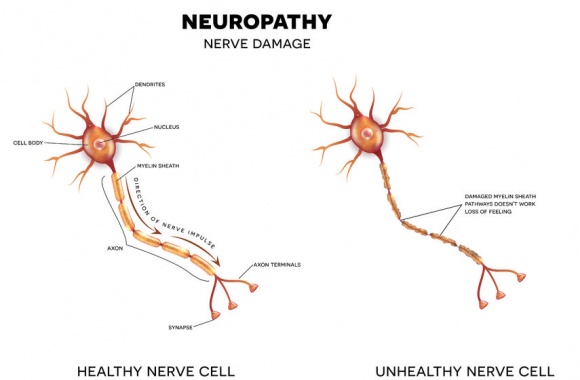Neuropathy
What is neuropathy?
Peripheral neuropathy, a result of damage to the nerves outside of the brain and spinal cord (peripheral nerves), often causes weakness, numbness, and pain, usually in your hands and feet. It can also affect other areas of your body.
Your peripheral nervous system sends information from your brain and spinal cord (central nervous system) to the rest of your body. The peripheral nerves also send sensory information to the central nervous system.
Peripheral neuropathy can result from traumatic injuries, infections, metabolic problems, inherited causes, and exposure to toxins. One of the most common causes is diabetes.
People with peripheral neuropathy generally describe the pain as stabbing, burning, or tingling. In many cases, symptoms improve, especially if caused by a treatable condition. Medications can reduce the pain of peripheral neuropathy.
What conditions can be treated?
Not a single disease, peripheral neuropathy is nerve damage caused by a number of conditions. Health conditions that can cause peripheral neuropathy include:
- Autoimmune diseases. These include Sjogren’s syndrome, lupus, rheumatoid arthritis, Guillain-Barre syndrome, chronic inflammatory demyelinating polyneuropathy, and vasculitis.
- Diabetes. More than half the people with diabetes develop some type of neuropathy.
- Infections. These include certain viral or bacterial infections, including Lyme disease, shingles, Epstein-Barr virus, hepatitis B and C, leprosy, diphtheria, and HIV.
- Inherited disorders. Disorders such as Charcot-Marie-Tooth disease are hereditary types of neuropathy.
- Tumors. Growths, cancerous (malignant) and noncancerous (benign), can develop on the nerves or press nerves. Also, polyneuropathy can arise as a result of some cancers related to the body’s immune response. These are a form of a degenerative disorder called paraneoplastic syndrome.
- Bone marrow disorders. These include an abnormal protein in the blood (monoclonal gammopathies), a form of bone cancer (myeloma), lymphoma, and the rare disease amyloidosis.
- Other diseases. These include kidney disease, liver disease, connective tissue disorders, and an underactive thyroid (hypothyroidism).
How does it work?
Treatment begins by identifying and treating any underlying medical problem, such as diabetes or infections.
Some cases of neuropathy can be easily treated and sometimes cured. Not all neuropathies can be cured, however. In these cases, treatment is aimed at controlling and managing symptoms and preventing further nerve damage.

Accelerate Your Health With Innovative Medicine
"They are super helpful getting me back on track with my thyroid (graves) issue! They helped me before and I got lazy with my eating and stress management. Now I’m getting back on track and am feeling much better again! Love these guys they really know what they are doing! It's an amazing clinic!"
"I am so glad I found East West. I have gained quite a bit of relief from my injections and the acupuncture is superb. I like their supplements and their knowledge and ability to help me problem solve my gut, hormone and inflammation issues. The staff are so personable and friendly and really care! It’s a wonderful clinic!"
"I came to the clinic to address the osteoarthritis of my hip. I could not be more pleased with the care I had. My treatment included various approaches. This integrated approach to health treatment blends the best of traditional western medicine with proven eastern practices. I highly recommend East West!"
